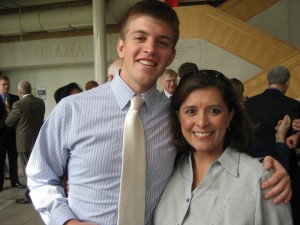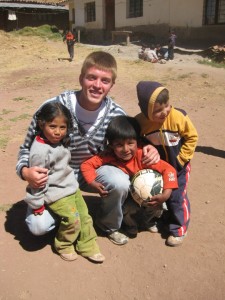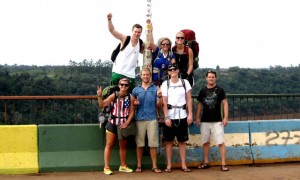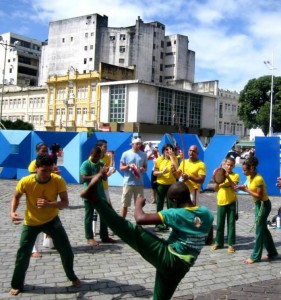by Gavin Roy
I took my first Spanish class in ninth grade. I remember lamenting to my teacher that there wasn’t a magic pill that could suddenly render one fluent in a foreign language. In my mostly white, suburban community south of Cleveland, Ohio, I never really experienced international culture nor did I have to wrestle with diversity issues. Thus, foreign language remained a superfluity to me, a bland thing of academia.
In 2006 I came to Valpo as an eager young science student majoring in meteorology and with one final language course to knock out. I dispassionately enrolled in an intermediate Spanish course with Prof. Nelly Zamora-Breckenridge that fall. This course would prove to be the spark that ignited the passion for language and international communication that burns strongly within me today.
Prof. Zamora-Breckenridge, a native Spanish speaker from Colombia, succeeded in enamoring me with her birth language in two ways: first, the novelty of conversing in a foreign tongue with a native user was a skill that suddenly intoxicated me, perhaps with the same enthusiasm that young children often have for codes and secret communication. More importantly, the relevant global topics she worked into her lessons opened my eyes to a vast new world of social issues and complexities. I suddenly needed to devote myself to learning this new language, this lens through which I could continue to see the world more clearly.
Over the following three-and-a-half years I took almost every Spanish course that Prof. Zamora-Breckenridge offered and graduated in 2010 with a Spanish minor alongside a mathematics minor and a major in meteorology.
My one regret (truly) during my time at Valpo was that I didn’t pursue the opportunity to study abroad. Realizing this mistake upon graduation, I arranged to travel down to Peru in the summer of 2010 to volunteer for six weeks at a rural mountain kindergarten outside of Cusco. I saw more poverty than I had ever seen in my life. I also saw environmental damage that I couldn’t believe: the ceaseless inky spew of old vehicles, dirty streams choked with refuse, and plastic waste cascading down hillside after hillside. But I also had a ceaselessly full heart from interacting with so many people and especially children bursting with pure joy – all in their native tongue. The kids were wonderfully blunt when I would make Spanish mistakes, after which they would go right back to being my best friend. What an incredible way to hone one’s language skills without fear of judgment or shame!
I came back to the States and experienced the “reverse culture shock” that I had until then believed to be just an exaggeration – namely, utter apathy for acquisitive power, social media angst, and numerous other tritenesses of consumer America to which I was previously immune.
I am currently about a year away from obtaining my PhD in atmospheric science at Colorado State University. Science continues to interest me but language and international communication continue to interest me even more. I have served as a translator and blog manager for the International Environmental Data Recovery Organization. I have traveled to the hurricane-prone Yucatán Peninsula of Mexico during two summers to teach an introductory meteorology course in Spanish at a university that has a goal of starting their own atmospheric science department.
And in 2011 I started teaching myself Brazilian Portuguese with my knowledge of Spanish, a fairly similar language, as a foundation. Learning and teaching through this beautiful language of Brazil is now a full-time hobby of mine. Brazil is a rapidly developing country, but with a population only 7% of which can speak English. I view this as an incredible opportunity: very infrequently do native English speakers have the chance to travel to a foreign country and be forced to speak the language of that country. This is a blessing and a curse. A curse, because it requires effort and non-laziness on the part of the American. A blessing, because communicating with a foreigner in their own language is truly an amazing experience. I mean it. In Brazil, this is not only possible but practically required.
Alongside my doctoral studies I now run a Portuguese-language YouTube channel for Brazilians who are learning English. Myself, my wife Lauren Roy [née Overstreet, VU ’11], and four other Valpo graduates traveled together down to the World Cup in Brazil in 2014. And I have aspirations of becoming a scientific translator of both Portuguese and Spanish in the future, helping to play a role in uniting the international efforts to address global climate change and environmental destruction.
There is no magic pill that will effortlessly grant one the ability to speak a foreign language. Learning a language takes years upon years of focus and dedication. But the ultimate reward of this effort is an unbelievably beautiful thing: there is no clearer way to “see” the world than by speaking with its inhabitants.
Gavin Roy is a 2010 Valpo graduate with a meteorology major and a Spanish and mathematics minor. During his time at Valpo, Professor Nelly Zamora-Breckenridge really instilled a love of language for him. After graduation, Gavin volunteered in a kindergarten for 6 weeks in Peru. He also traveled down to the Yucatan Peninsula of Mexico during the summer semesters of 2012 and 2013 to teach an introductory meteorology course in Spanish in the Engineering Department of the Autonomous University of the Yucatan. Currently, he studies at Colorado State University getting his PhD in atmospheric science. Additionally, he has been aggressively teaching himself Brazilian Portuguese, which is an enchanting and rapidly growing (in influence) language that is somewhat similar to Spanish.




Leave a Reply